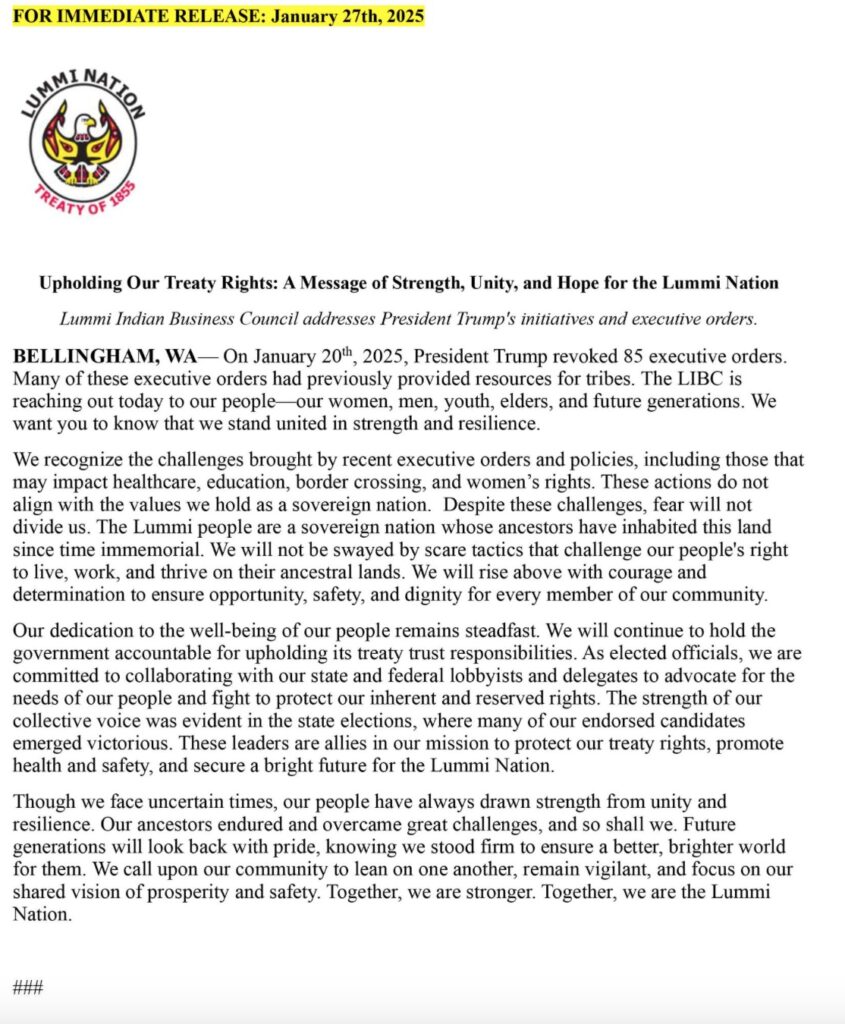The Tanana Chiefs Conference has issued a statement addressing the potential effects of recent executive orders signed by President Donald Trump on federal programs, policies, and funding that impact Alaska Native communities. TCC said it is closely monitoring the president’s directives and taking steps to ensure tribal operations and programs remain uninterrupted.
One of those recommendations is to draw down all available money before the pause on federal grants takes effect, which was to be at 5 p.m. on Tuesday.
Update: A federal judge has blocked the pausing of the federal grants after the Marxist group known as Democracy Forward sued, claiming the pause is unconstitutional.
The White House Office of Management and Budget had ordered a temporary pause on all outgoing grants until they are audited for things like promoting Marxist ideology and weaponizing the federal government against the people of America.
Read the details about the temporary pause at this link:
The Tanana Chiefs statement is far different and more measured than the one published by the Lummi Tribe in Whatcom County of Western Washington, which declared that it is a sovereign nation and it expects its money to flow from the federal government.
“These actions do not align with the values we hold as a sovereign nation,” the Lummi Tribe wrote about the temporary pause and other executive orders from the president, who the tribe clearly said it did not support in the 2024 election.

Tanana Chiefs, which has at least $1 billion in assets that have been provided by federal taxpayers, took a more measured approach than the Lummi and listed the executive orders and their implications for the TCC region in Interior Alaska and other Alaska Native communities.
Here’s what the TCC wrote about the executive orders and their regional impact:
Unleashing American Energy
This order temporarily halts disbursement of funds under the Inflation Reduction Act and Infrastructure and Jobs Act for projects deemed inconsistent with oil, gas, and mineral resource development.
Regional Impact: Delays in funding for energy and infrastructure projects could impact Tribal initiatives. TCC advises Tribes to prepare for potential extended pauses in federal assistance.
Ending Radical and Wasteful Government DEI Programs and Preferencing
This order revokes Executive Order 13985, discontinuing programs and grants aimed at advancing racial equity and support for underserved communities, including those benefiting Alaska Native Tribes.
Regional Impact: Reduced focus on Tribal access to grants and services may affect community development efforts. TCC remains committed to advocating for equitable funding and resources.
Unleashing Alaska’s Extraordinary Resource Potential
This order places a moratorium on the Ambler Road Environmental Impact Statement and mandates a review of Alaska Native land policies.
Regional Impact: TCC supports Tribal resolutions opposing the Ambler Road project due to its potential impacts on subsistence resources. TCC will engage in discussions to protect Tribal land rights and subsistence practices.
Ending Illegal Discrimination and Restoring Merit-Based Opportunity
This order mandates compliance with federal anti-discrimination laws while eliminating diversity, equity, and inclusion (DEI) programs in federal contracts and grants.
Regional Impact: Native Preference policies rooted in federal law remain unaffected, but organizations may need to review contract terms. TCC will continue advocating for policies that uphold Tribal sovereignty and self-determination.
Restoring Names That Honor American Greatness
This order reverts the name of Denali to Mount McKinley while retaining Denali National Park’s name.
Regional Impact: TCC, in alignment with the Alaska State Legislature, opposes the name change, emphasizing the cultural significance of “Denali” in the Koyukon Athabascan language. Efforts will continue to preserve the name.
In response to the Executive Orders, TCC is encouraging Tribes to contact federal agencies regarding pending awards or disbursements, dvising the drawdown of available funds under 638 or Self-Governance agreements before the funding freeze takes effect, and recommending a review of award agreements to identify clauses that protect against potential claw-backs.
TCC also assured that Indian Health Services (IHS) funding, which is forward-funded, remains unaffected, ensuring uninterrupted clinic operations. Similarly, TCC’s forward funding approach for Bureau of Indian Affairs (BIA) programs guarantees that critical services for Tribes continue without disruption.
TCC’s Commitment to Advocacy and Monitoring
TCC reaffirmed its commitment to advocating for Alaska Native communities amid the evolving federal landscape. “We hear and understand the concerns of our Tribes and Tribal Members regarding these announcements,” TCC stated. “We will continue to monitor the directives coming from the Administration and assess their potential impacts on our region and communities.”
Tanana Chiefs Conference says it “provides a unified voice in advancing sovereign tribal governments through the promotion of physical and mental wellness, education, socioeconomic development, and culture of the Interior Alaska Native people.”








